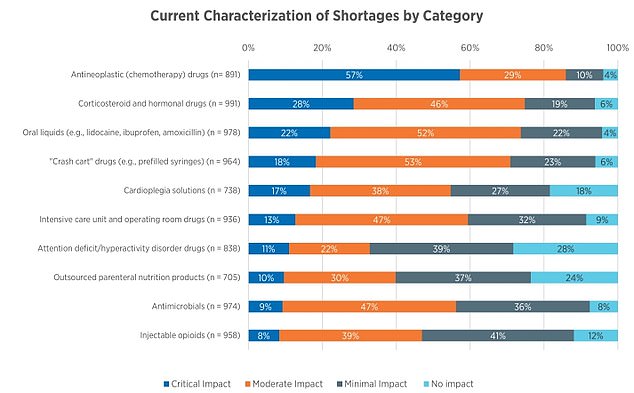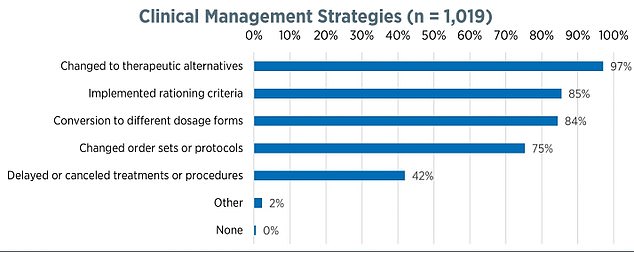Up to eight in 10 hospitals and pharmacists are rationing drugs or delaying appointments as they battle a crippling medicine shortage, a report suggests.

The American Society of Health-System Pharmacists surveyed more than 1,000 pharmacists and 99 percent said they were struggling to stock enough of the drugs they needed
A national survey published Thursday showed there were 309 ongoing drug shortages, the highest number in nearly 10 years. And just a few less than the all-time high of 320.
The American Society of Health-System Pharmacists, a group that tracks US drug availability, surveyed more than 1,000 pharmacists and 99 percent said they were struggling to stock enough of the drugs they needed.
The group attributes the issue to limited investment in manufacturing capacity, subpar manufacturing quality and a breakdown in the supply chain, as well as extreme price competition among generic drug makers.
The critical shortage is causing 85 percent of pharmacists to ration medications and 42 percent to delay or cancel treatments and procedures, potentially risking the lives of severely ill patients who will now miss out on the care they need.

BIG Pharma
The healthcare professionals surveyed stressed the shortages were impacting patient care, with one-third of pharmacists saying the shortages were critically impactful, and more than half, 57 percent, saying they were facing critical shortages of chemotherapy drugs specifically.
In addition to chemotherapy drugs, other drugs facing limited supplies are hormonal drugs, drugs used in intensive care units and in operating rooms, and oral liquids, which include the pain reliever ibuprofen and the antibiotic amoxicillin.
Others include those used to manage attention deficit or hyperactivity and injectable opioids.
Following chemotherapy medications, the shortage most pharmacists say causing a critical impact are corticosteroid and hormonal drugs.
Corticosteroids, often known as steroids, are types of anti-inflammatory drugs. Suddenly stopping medications like these can cause a person to enter withdrawal, leading to dizziness, weakness, headaches, mood swings, and pain.
In addition to putting patients’ lives in danger, the lack of drugs is also costing the healthcare system money.
Managing drug shortages, purchasing alternative doses, and obtaining drugs through alternative sources all cost healthcare facilities more money than if the usual drugs were available.
Pharmacists reported the shortages were adding between 5 percent and 20 percent to budgets.
Due to the shortages, healthcare providers are forced to make difficult choices, including delaying a patient’s treatment or changing the dose or type of medication the patient receives.
To deal with the shortages, most pharmacists, 97 percent, reported they had changed the medication a patient receives to another similar medication.

One-third of pharmacists said the shortages were critically impactful, and more than half, 57 percent, said they were facing critical shortages of chemotherapy drugs specifically

Due to the shortages, healthcare providers are forced to make difficult choices, including delaying a patient’s treatment
Eighty-five percent began rationing drugs and 42 percent said they were forced to cancel or delay treatments and procedures because they did not have access to the necessary drugs.
‘Pharmacists have been managing drug shortages routinely for decades, but we’re now seeing longer, more persistent shortages. We’re facing shortages for more than 300 drugs, and that trajectory is growing. This reality is unsustainable for hospitals and patients alike’, said ASHP Chief Executive Officer Paul Abramowitz.
‘Pharmacists in hospitals and health systems are working diligently with other clinicians to provide safe and effective care, despite ongoing drug shortages, by finding needed medications, identifying substitutes, and managing changes to treatment plans when required.
 ‘In some cases, there are no alternatives to the affected drugs, which puts patients at risk. This issue requires quick action from Congress to address the underlying causes of shortages and ensure patients have the medications they need’.
‘In some cases, there are no alternatives to the affected drugs, which puts patients at risk. This issue requires quick action from Congress to address the underlying causes of shortages and ensure patients have the medications they need’.
ASHP has called on Congress to better enforce existing laws and implement solutions to reduce disruptions in the drug supply chain, especially for lower-cost generic drugs.
The organization has sent several recommendations to Congress to rectify the situation, including calling on them to enforce existing shortage prevention requirements and levy penalties on manufacturers that do not develop risk management plans.
It also wants Congress to improve transparency into manufacturing quality and encourage the establishment of new manufacturers and manufacturing sites.
Written by Alexa Lardieri for The Daily Mail ~ August 11, 2023
